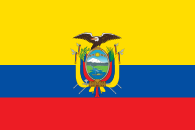Ecuador
Ecuador is a country in South America whose main international claim to fame is an archipelago in the Pacific Ocean known as the Galápagos Islands, a secluded paradise of biodiversity whose inhabitants don't fear humans as much as the rest of the world due to the place mostly being free of them. Iconic critters include the finches that pop culture attributes to Darwin's theory of evolution, and the Galápagos tortoise, the largest in the world. The country was also known for being Julian Assange's hideout, until he was kicked out in 2019.
Politics
Ecuador is notable for their indigenous groups, represented by CONAIE (Confederation of Indigenous Nationalities of Ecuador), which were responsible for overthrowing three of the country's leaders within the span of 1997-2005.[1] Things calmed down for a while when leftist leader Rafael Correa got elected as part of South America's pink tide, as he succeeded in significantly reducing the country's inequality[2] while also promising not to drill the oil in Yasuni National Park, in exchange for a huge sum of money from the United Nations. Unable to acquire the money, he backtracked and started drilling, which naturally pissed off the indigenous tribes living there.
His former Vice-President Lenín Moreno got elected in 2017 and proceeded to backstab Correa by backtracking on his entire leftist agenda while preventing him from ever running again. Though Ecuadorians were initially relieved to have a new face, they steadily became more and more annoyed with his neoliberal policies.[3] This came to a head in October 2019, when he cancelled fuel subsidies as part of an austerity package that came with a $4.2 billion IMF loan, sending fuel prices sky-high and sparking mass protests so intense that his government had to flee the capital of Quito. However, he ultimately managed to keep his position as leader by reaching a deal with the country's indigenous groups, including backtracking on the fuel subsidies.[4]
References
- ↑ Indigenous anger potent political weapon in Ecuador
- ↑ Ecuador After Ten Years of President Correa: New Paper Examines Key Indicators, Reforms, and Policy Changes
- ↑ Moreno’s approval rating tumbles as popular concern grows over border violence
- ↑ Ecuador's Moreno, indigenous groups reach deal to end protests
